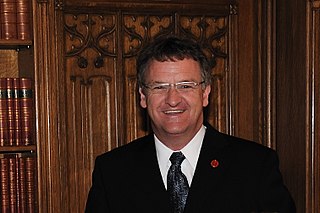Related Research Articles

The Progressive Conservative Party of Canada was a centre to centre-right federal political party in Canada that existed from 1942 to 2003.

Ralph Edward Goodale is a Canadian diplomat and retired politician who has served as the Canadian High Commissioner to the United Kingdom since April 19, 2021.

John Bracken was a Canadian agronomist and politician who was the 11th and longest-serving premier of Manitoba (1922–1943) and later the leader of the Progressive Conservative Party of Canada (1942–1948).
The Alberta Liberal Party is a provincial political party in Alberta, Canada. Founded in 1905, it is the oldest active political party in Alberta and was the dominant political party until the 1921 election, with the first three provincial Premiers being Liberals. Since 1921, it has formed the official opposition in the Legislative Assembly of Alberta several times, most recently from 1993 until 2012. Fourteen Liberals have served as Leader of the Opposition of Alberta.

The 1980 Canadian federal election was held on February 18, 1980, to elect members of the House of Commons of Canada of the 32nd Parliament of Canada. It was called when the minority Progressive Conservative government led by Prime Minister Joe Clark was defeated in the Commons.

The 1945 Canadian federal election was held on June 11, 1945, to elect members of the House of Commons of the 20th Parliament of Canada. Prime Minister William Lyon Mackenzie King's Liberals won a third term. The party fell five seats short of a majority but was able to rule as a majority government with the support of Independent Liberal MPs.

The 1979 Canadian federal election was held on May 22, 1979, to elect members of the House of Commons of Canada of the 31st Parliament of Canada. It resulted in the defeat of the Liberal Party of Canada after 16 years in power, 11 of them under Prime Minister Pierre Trudeau. Joe Clark led the Progressive Conservative Party to power but with only a minority of seats in the House of Commons. The Liberals, however, beat the Progressive Conservatives in the overall popular vote by more than 400,000 votes. Taking office on the eve of his 40th birthday, Clark became the youngest prime minister in Canadian history.
The Liberal–Labour banner has been used several times by candidates in Canadian elections:
The following is a timeline of the Canadian federal election, 2004. More on the election in general is available in the article 2004 Canadian federal election.

The 1926 Canadian federal election was held on September 14, 1926, to elect members of the House of Commons of Canada of the 16th Parliament of Canada. The election was called after an event known as the King–Byng affair.

Allan Frederick Lawrence, was a Canadian politician and served as both a provincial and federal cabinet minister.
Louis Ralph "Bud" Sherman was a politician in Manitoba, Canada. He served in the House of Commons of Canada during the 1960s and was a Progressive Conservative member of the Legislative Assembly of Manitoba from 1969 to 1984, serving as a cabinet minister in the government of Sterling Lyon.
Rodney Stewart Clement was a politician in Manitoba, Canada. He was a member of the Legislative Assembly of Manitoba from 1949 to 1959 and again from 1966 to 1968. Initially elected as an Independent, Clement ended his career as a member of the Manitoba Liberal Party.
William John Vankoughnet is a former politician in Ontario, Canada. He was a Progressive Conservative member of the House of Commons of Canada from 1979 to 1993, and a Progressive Conservative member of the Legislative Assembly of Ontario from 1995 to 1999.

Gordon Minto Churchill was a Canadian politician. He served in the Legislative Assembly of Manitoba from 1946 to 1949 as an independent, and in the House of Commons of Canada from 1951 to 1968 as a Progressive Conservative. He served in the cabinet of Prime Minister John Diefenbaker.
John Martin Oostrom was a Canadian business executive and politician. He was the first Dutch-born Canadian elected to the House of Commons of Canada.

Fabian Manning is a politician in Newfoundland and Labrador, Canada. Manning served as a Progressive Conservative and later as the independent Member of the House of Assembly for the district of Placentia and St. Mary’s from 1999 to 2005. From 2006 to 2008 he was the Conservative Party of Canada Member of Parliament for the riding of Avalon. After his defeat in the 2008 federal election Manning was appointed to the Senate of Canada on January 2, 2009, he resigned his Senate seat on March 28, 2011, to run for election in his former riding of Avalon in the 2011 federal election, but was unsuccessful. Prime Minister Stephen Harper re-appointed Manning to the Senate on May 25, 2011.
Alain Tardif was a Liberal party member of the House of Commons of Canada. He was a lawyer by career.
Yvon L'Heureux was a Liberal party member of the House of Commons of Canada. He was a manufacturer and merchant by career.
Wilfrid Garfield Case also known as W. Garfield Case,, was a Canadian politician who served as a Progressive Conservative Member of Parliament and Mayor of Owen Sound, Ontario. He is best known for his upset victory over Defence Minister General Andrew McNaughton in the Grey North federal by-election held on 5 February 1945.
References
- ↑ Simpson, Jeffrey (8 March 1979). "Criticizes Liberal policies, MP crosses floor to Tories". The Globe and Mail . p. 1.